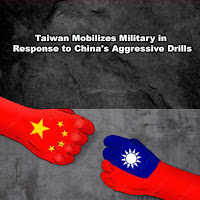Taiwan scrambled jets and put missile, naval, and land units on high alert Thursday in response to Chinese military exercises around the island. These maneuvers coincide with the inauguration of Taiwan's new president, Lai Ching-te, this week. Beijing claims Taiwan as part of its territory and conducts near-daily military activities to pressure the self-governing democracy.
China’s military justified the two-day exercises as punishment for separatist forces advocating for Taiwan's independence. The People’s Liberation Army (PLA) routinely sends navy ships and warplanes into the Taiwan Strait to weaken Taiwan’s defenses and intimidate its population, who strongly support their de facto independence. Taiwan’s Defense Ministry condemned the drills, labeling them "irrational provocation" that threaten regional peace and stability. The ministry affirmed that Taiwan seeks no conflicts but will not avoid one if necessary.
In his inauguration speech on Monday, President Lai urged Beijing to cease its military intimidation. He pledged to neither yield nor provoke and emphasized maintaining freedom and democracy in the face of external threats. During a visit to a marine base in Taoyuan, Lai highlighted international concern over Taiwan’s security, reflecting its crucial role in global supply chains for advanced computer chips and its status as a democratic stronghold against Chinese ambitions in the Asia-Pacific.
Lai has expressed a desire for dialogue with Beijing while avoiding conflicts that could involve Taiwan’s main ally, the U.S., and other regional partners like Japan and Australia. Meanwhile, Taiwan’s opposition Nationalist Party, seen as pro-China, condemned Beijing’s actions and urged restraint to avoid conflict in the Taiwan Strait.
The PLA’s Eastern Theater Command announced the exercises aim to test naval and air capabilities, joint strike abilities, and control of the battlefield. The command’s statement called the drills a severe warning to separatist forces and external interference. The exercises cover five points around Taiwan, including the outlying islands of Matsu and Kinmen, closer to the Chinese mainland.
China’s coast guard also conducted law enforcement drills near Kinmen and Matsu. While China frames these actions as punishment for Taiwan’s election results, the Democratic Progressive Party has governed Taiwan for over a decade. The pro-China Nationalist Party recently gained a slim majority in parliament.
In Australia, U.S. Marine Corps Lt. Gen. Stephen Sklenka urged Asia-Pacific nations to condemn China’s military exercises. He emphasized that while China’s response to Taiwan's international presence is expected, it must still be condemned publicly, particularly by regional nations, to have a more significant impact.
Japan’s top envoy, visiting the U.S., reiterated Japan's shared values with Taiwan, including freedom and democracy. Foreign Minister Yoko Kamikawa highlighted Taiwan as a crucial partner with close economic ties and called for maintaining peace in the Taiwan Strait, a vital global shipping route, during discussions with U.S. Secretary of State Antony Blinken.
As tensions rise, the international community watches closely, aware of Taiwan's strategic importance and the potential ramifications of China's aggressive stance.





0 Comments